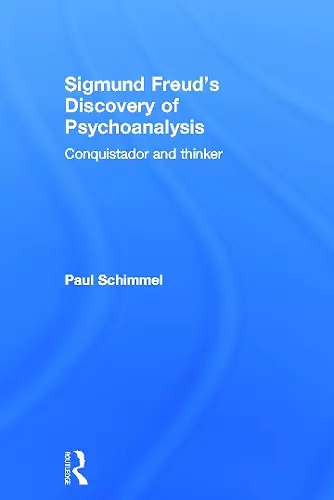Sigmund Freud's Discovery of Psychoanalysis
Conquistador and thinker
Format:Hardback
Publisher:Taylor & Francis Ltd
Published:26th Sep '13
Currently unavailable, and unfortunately no date known when it will be back
This hardback is available in another edition too:
- Paperback£41.99(9780415635554)

Sigmund Freud’s discovery of psychoanalysis explores links between Freud’s development of his thinking and theory and his personal emotional journey. It follows his early career as a medical student, researcher and neurologist, and then as a psychotherapist, to focus on the critical period 1895-1900. During these years Freud submitted himself to the process that has become known as his ‘self-analysis’, and developed the core of his psychoanalytic theory. Drawing on Freud’s letters to his friend and confidant Wilhelm Fliess, and on selected psychoanalytic writings in particular his ‘dream of Irma’s injection’, Paul Schimmel formulates psychoanalytic dimensions to the biographical ‘facts’ of Freud’s life.
In 1900 Freud wrote that he was ‘not a thinker’ but ‘a conquistador’. In reality he was both, and was engaged in a lifelong emotional struggle to bring these contradictory sides of his personality into relationship.His psychoanalytic discoveries are conceptualized in the context of his need to achieve integration within his psyche, and in particular to forge a more creative collaboration between ‘conquistador’ and ‘thinker’.
Sigmund Freud’s discovery of psychoanalysis will be of interest to psychoanalysts, psychoanalytic psychotherapists, academics and teachers of psychoanalysis, and to all serious students of the mind.
"Paul Schimmel, in this concise volume, explores a particular tension in Freud’s character and motivation between the ‘conquistador’ and the ‘thinker’ or man of science. A dialectical interplay between Freud’s impassioned drive for discovery alongside a rational, deductive capacity for revision and reformulation of ideas is traced through his major ideas, from the ‘Project’ through to ‘Analysis terminable and interminable’. His relationship with Fliess, studies with Charcot, self-analysis, dream of Irma’s injection and ideas on mourning are also illuminated by this perspective. A fascinating, humanising study." - Paul Williams, Training Analyst, British Psychoanalytical Society; Joint Editor-in-Chief, The International Journal of Psychoanalysis, 2001-2007
"Paul Schimmel's wide scholarship adds intriguing perspectives on how, with the gradual integration of Freud's passionate will to greatness and his contained, intuitive reflective capacity, came increased self awareness and the 'discovery' of the new universe of psychoanalysis, of the unconscious and transference."Frances Thomson-Salo, Associate Professor Training Analyst Australian Psychoanalytical Society, and Honorary Fellow, Department of Psychiatry, University of Melbourne
"Schimmel offers a reading of Freud that is found in Freud’s own words which adds an authenticity to his argument. He therefore has something important to say in the perennial question as to whether or not psychoanalysis is an art or ascience…This is a thoughtful, well-researched book, which deserves to be read and added to the canon of Freudian literature that takes us."– Alistair Ross, Oxford University, European Journal of Psychotherapy & Counselling
"History is defined in many ways by many people. In 1906 William Osler said, "History is simply the biography of the mind of man". The mind of man was deepened and we were given new ways to explore it by Freud. Keeping alive the spirit of open enquiry into the mind of man enriches all our lives. Paul Schimmel’s book makes a valuable contribution towards that ongoing study and I recommend this enjoyable and readable book." – Maurice Whelan, Australasian Journal of Psychotherapy
"To maximize one’s enrichment from Schimmel’s work one needs to have familiarity with the subject—experienced readers of Freud, psychology historians, scholars, and clinicians interested in theory are those who will be most rewarded by this well-written, compact, very full treatment of critical periods and issues in the life and thinking of the founder of psychoanalysis."–Thomas P. Kalman, Psychodynamic Psychiatry, March 2015
"Paul Schimmel, in this concise volume, explores a particular tension in Freud’s character and motivation between the ‘conquistador’ and the ‘thinker’ or man of science. A dialectical interplay between Freud’s impassioned drive for discovery alongside a rational, deductive capacity for revision and reformulation of ideas is traced through his major ideas, from the ‘Project’ through to ‘Analysis terminable and interminable’. His relationship with Fliess, studies with Charcot, self-analysis, dream of Irma’s injection and ideas on mourning are also illuminated by this perspective. A fascinating, humanising study."–Paul Williams, Training Analyst, British Psychoanalytical Society; Joint Editor-in-Chief, The International Journal of Psychoanalysis, 2001-2007
"Paul Schimmel's wide scholarship adds intriguing perspectives on how, with the gradual integration of Freud's passionate will to greatness and his contained, intuitive reflective capacity, came increased self awareness and the 'discovery' of the new universe of psychoanalysis, of the unconscious and transference."–Frances Thomson-Salo, Associate Professor Training Analyst Australian Psychoanalytical Society, and Honorary Fellow, Department of Psychiatry, University of Melbourne
ISBN: 9780415635547
Dimensions: unknown
Weight: 385g
176 pages